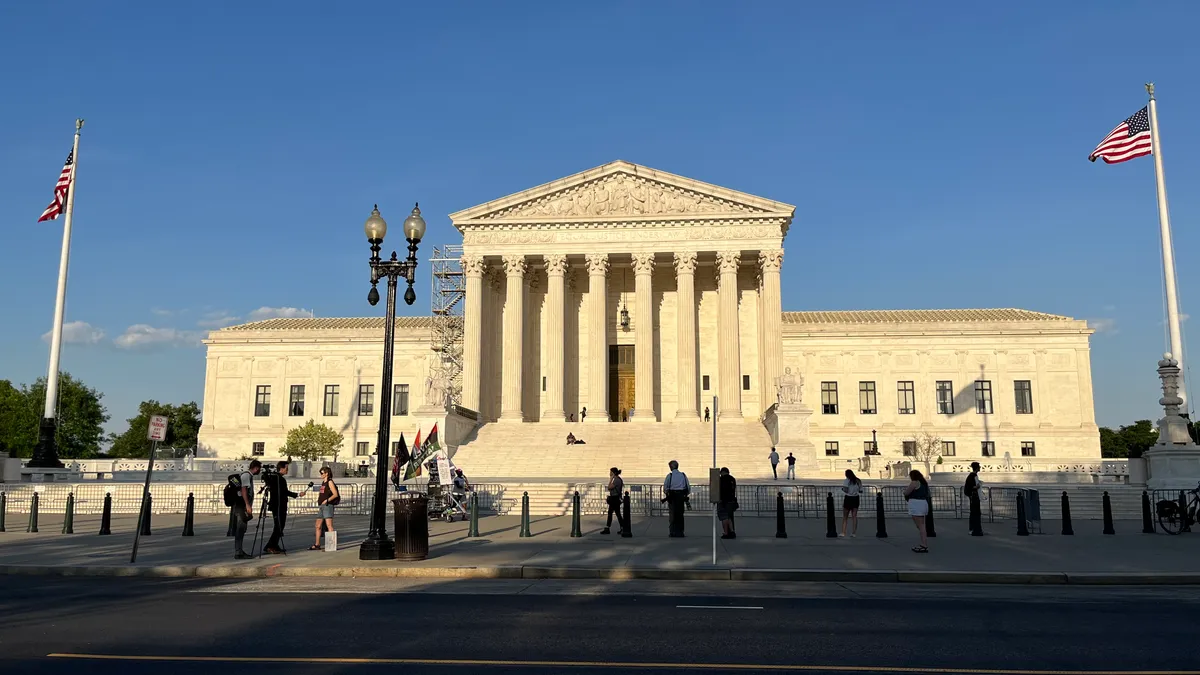The Supreme Court on Friday allowed the abortion pill mifepristone to remain on the market for the time being, suspending a lower court order that would have curtailed its availability in the U.S.
The 7-2 ruling stays a verdict earlier this month by U.S. District Court Judge Matthew Kacsmaryk invalidating the Food and Drug Administration’s 2000 approval of mifepristone. Justices Samuel Alito and Clarence Thomas dissented.
The justices’ decision returns the case to the Fifth Circuit Court of Appeals, which on April 13 had partially blocked Kacsmaryk’s order but imposed limits on the drug’s use. The U.S. Department of Justice appealed that decision to the Supreme Court, which set a deadline of midnight Friday to decide on a course of action.
"Allowing the courts to second-guess a decision by the FDA to approve a medicine would create significant uncertainty and harm for manufacturers, patients and physicians."

Pharmaceutical industry trade group PhRMA
In a statement, President Joe Biden said his administration will continue to fight limits on mifepristone in the courts.
The case returned the issue of abortion back to the Supreme Court just 10 months after it overturned Roe v. Wade, ending the constitutional right to the procedure. Many states have since implemented strict abortion laws, either banning the procedure entirely or putting in place severe restrictions that have forced women to travel out of state or put off care.
First approved in 2000, mifepristone is used in an estimated half of all abortions in the U.S., often with another drug misoprostol. The FDA has affirmed its safety and effectiveness in terminating pregnancy over the drug’s 23 years on the market, as have dozens of scientific studies.
However, its availability has been jeopardized by a lawsuit brought last year by the conservative group Alliance for Hippocratic Medicine, which sued the FDA and manufacturer Danco Laboratories, citing issues with the approval process and safety concerns.
U.S. state abortion bans
Kacsmaryk ruled on April 8 to suspend the drug’s approval, imperiling access across the country. Hours later, a federal court in Washington ordered the FDA to keep the drug on market in the 17 states where Democratic attorneys general had sued in a separate case.
Kacsmayrk’s ruling was then partially blocked last week by the Fifth Circuit Court of Appeals in Louisiana. A three-judge panel there agreed to keep mifepristone on the market, but without labeling changes made by the FDA since 2016 that permitted mail order prescribing and distribution via pharmacies.
The rulings from both Judge Kacsmaryk and the Fifth Circuit are viewed as unprecedented incursions into the FDA’s oversight over the approval and regulation of prescription drugs. Their impact could carry beyond mifepristone too, opening up the possibility of future challenges to the agency’s oversight of other drugs and of medical devices.
That threat spurred food and drug law scholars and former FDA officials to defend the agency. Hundreds of biotech leaders also chimed in, arguing the case’s ramifications could undermine the FDA’s oversight more broadly.
"Congress gave the FDA the authority to determine whether a medicine is safe and effective for patients to use," PhRMA, the industry trade group, said in a statement Friday. "Allowing the courts to second-guess a decision by the FDA to approve a medicine would create significant uncertainty and harm for manufacturers, patients and physicians."
Janet Woodcock, the FDA’s principal deputy commissioner, previously warned of “significant chaos” for patients and prescribers if the Fifth Circuit Court order were to remain in place.
While the Fifth Circuit had stayed Kacsmaryk’s ruling, it barred prescribing by mail and limited mifepristone’s use to weeks earlier in pregnancy. In a court filing, Woodcock described how mifepristone’s broad availability could not be so neatly separated from the more recent changes to its use and distribution.
On Wednesday, GenBioPro, the maker of a generic version of mifepristone, sued the FDA in an effort to ensure it could continue selling the pill. Seeking to stop any regulatory enforcement that would result from court action, GenBioPro argued the FDA cannot remove an approval without first conducting a formal process















